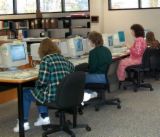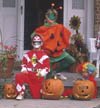The patron who comes in to use the Internet

With the advent of computers, public libraries have seen the exponential growth of the patron who comes in to use the Internet. In the past, this person would not have been a library user, since the library would have had nothing to offer him. In American society, although the world of reading and learning is extolled by every politician, most people only read books during that brief period of youth when the schoolteacher has a gun to their heads. Afterwards, their careers as library users came to a happy and fruitful conclusion.
In the past, young juvenile offenders were not library users. If you watch West Side Story you see no reference to libraries. Neither the Jets nor the Sharks would have any interest in coming to a library. That was before the Internet.
With prodding from the Federal government, libraries geared up in the 90’s to become computer centers. The Internet was going to fill libraries with a world of information and communication only dreamed of before. During those heady times it was never envisioned that the Internet would become a form of mass media, sort of a mixture of a telephone, cable television, a pinball machine and a peep show.
Today you walk through the modern public library and you see people of all ages and dress staring at computer terminals. What are they all doing? Let’s take a closer look. One woman is sending e-mail to her girl friend. A man is searching for a wife in Indonesia. A young student is playing what looks like a video game. The girl next to him is using Instant Messenger. A man in a t-shirt is looking at wrestling scores. A woman is shopping on E Bay for tights. Those giggling young things are looking at myspace.com.
Suddenly a popular destination, the Internet rooms stretch library budgets, and take up increasing per cent ages of staff member’s time. Extra chairs must be provided to allow for seating for the waiting to use the Internet area.
Recently libraries have been putting in wireless Internet connections. Sort of like a restaurant with a byob policy, the theory is that the patrons will bring in their own notebooks and simply use the library’s broadband connection. The electronic equivalent of corkage. However most people who own notebooks (they are still expensive) also have their own Internet connection at home.
Perhaps its good that libraries are no longer the cloistered repositories they once were. First came movies, then the Internet. Many librarians now find themselves in the real world. Even when they are at work.

